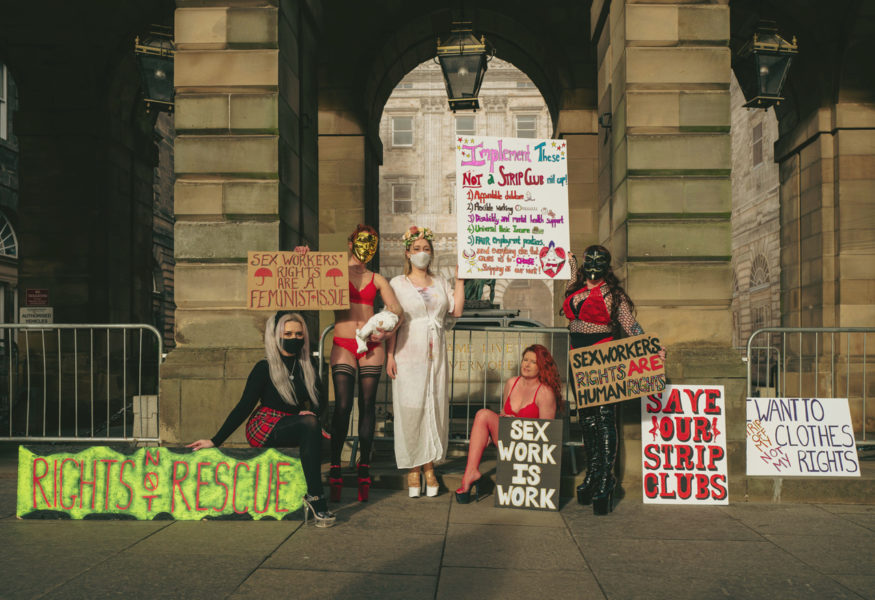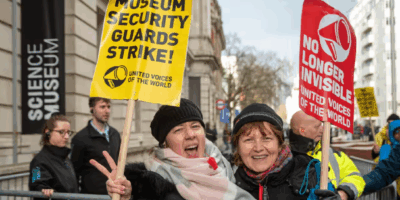Search

United Sex Workers (USW), the sex workers branch of United Voices of the World Union (UVW), has won the right to enter a Judicial Review of the City of Edinburgh Council’s (CEC) strip club ban.
The Court of Sessions granted the Edinburgh strippers permission to be represented by their trade union in court action. They want to oppose the ban. The court also granted USW a Protective Expenses Order, which prevents the union from being liable for the Council’s legal expenses in the case.
The Labour-led CEC had tried to block USW/UVW from participating, denying a voice to the workers directly impacted by the council’s ban.
USW is delighted that it will be able to put forward its members’ arguments to the Court. They will be the ones most personally impacted by the decision to close the strip clubs from next spring, and risk being either forced into poverty or more dangerous forms of sex work.
USW organiser, Mina, said: “I’m incredibly relieved that we have reached this point. It’s a massive win that we are now able to contribute to the Judicial Review and explain why we believe a strip club ban to be unlawful but I’m also shocked by the level of antagonism of the Council who seems to have done everything in their power to exclude the voices of strippers – the people who will be most affected – from court proceedings.”
The Council tried a very wide range of technical, legalistic arguments against USW’s participation: that USW should not be allowed to represent its members, and that every individual member should have applied for Legal Aid and raised their own, separate proceedings. Considering this would have led to USW members having to publicly disclose their engagement in sex work which could seriously disrupt their personal lives, this position is disappointing coming from any Council, but particularly a Labour-led one. The stripping and sex work industries are often precarious and in need of adequate labour protections and USW fails to understand why a Labour Council would want to stop a union from representing its members in this way.
The Council also argued that even if members lost their jobs, had to move to another city to work which would result in losing their homes and splitting up their families, this was not a sufficiently severe impact for them to argue they had suffered a breach of their rights under Article 8 of the European Convention on Human Rights to respect for private and family life.
Furthermore, CEC did not run any preliminary arguments against the strip club operators but only against USW in order to keep strippers from being represented directly in court proceedings.
Solicitor for USW, Rosie Walker of Gilson Gray LLP said: “My clients are delighted to have been granted permission to join the Judicial Review and to have got a Protective Expenses Order. It has taken a great deal of hard work just to reach this stage and we now look forward to bringing the dancers’ voices before the Court. The Council’s policy raises important issues of public importance including indirect gender discrimination, violence against women and the right of a Trade Union to represent its members in court. Closing the strip clubs will have a hugely detrimental impact on the lives of the women who work there. We are delighted that the Court will now hear all the arguments before reaching its decision.”
It is frustrating to see that CEC chose to spend very large sums of public money in a cost-of-living crisis to instruct a team of lawyers to spend almost two and a half days in Court opposing USW’s motions to enter the review and to obtain a Protective Expenses Order. As a result, USW also had to spend a large part of its very limited, crowdfunded budget just to join the action rather than spending it on reviewing the actual decision to close the strip clubs.
A full Hearing willl take place in the Court of Session on 1 and 2 December 2022.

25.06.2025 / Justice for Cleaners / St Helier and Epsom

12.06.2025 / Natural History, Science and V&A Museums